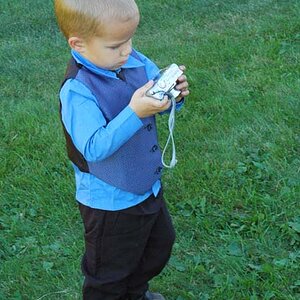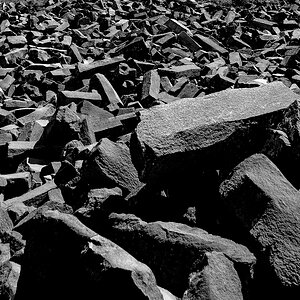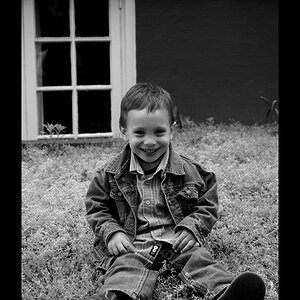NayLoMo6C
No longer a newbie, moving up!
- Joined
- Dec 28, 2010
- Messages
- 819
- Reaction score
- 79
- Location
- San Francisco, CA
- Can others edit my Photos
- Photos OK to edit
I know this thread is about a month old but....here's my thoughts...
1. You don't go into business to make your competitors happy. Now, you're not going into business to make them pissed off either. But b/c you get hate mail from other photographers doesn't mean you should change to meet their standards. Your business is your business.
2. I have known at least two other photographers very similar to you. Both relied solely on CL. Both did this as a second job/"hobby". Both handed over a DVD (one of them didn't even do edits--just gave over RAW or usually jpeg files). BTW, both are out of business now. But then most people who try to start photographic businesses go out of business--it's a difficult business world to succeed in as a photographer (which is part of the reason you're getting the hate mail).
3. Definitely get the insurance. And forget the rationale that it's a "hobby"...no-way you'll be able to justify that unless you either shoot a number of weddings for free or you can document that you lose money. There are just too many wedding photographers out there for the IRS to accept a position that it's only a hobby for you. And definitely expect a disgruntled competitor to turn you in to the State or IRS (did you know that the IRS gives people a percentage of the money gained when a case is turned in that produces revenue....ie: back taxes?).
4. Just me personally but I think you're under-cutting yourself. There is value in a flat rate fee (b/c you're appealing to folks who are cheap, who aren't going to pay $10k for a wedding and where prices is their primary decider) b/c they're afraid the photographer is going to bankrupt them and when you tell them it's likely 2-3 hours, they can smile and live with that in their budget. And to you (no offense) but with a day job, this is found money...it's extra cash for you. But think of it this way....if this was your day job, at about $600 a wedding/session, you'd have to shoot about 100 weddings a year (which is a phenomenal amount, especially given how seasonal the numbers tend to break down) to make $60k gross (which would be about $40-45k after you figure in insurance, business expenses, some possible equipment upgrades). Your profile says San Francisco...I don't think $40k goes very far there (and I don't think most wedding photographers would tell you that 100 clients per year is realistic). And....having said all that, you may be very comfortable shooting with the model that you do and making $400-$600 per wedding. If that's the case, you can now understand why you're getting the hate from people who do this as their day job (and charge $2,000 per wedding as a bargain-basement level).
5. Just a couple of business advice comments I'd offer:
--I would rarely attempt to compete on price. Yes, you do. And you're successful (up to a point). But something that is true for all types of business: customers that you gain primarily on price are the ones who are the least loyal. They will recommend you but only as long as you're the cheapest. They are also more likely to sue (or threaten to take you to court) b/c to them, it's almost entirely about getting the cheapest price available. And there will always be someone else around who can undercut your prices and do it cheaper. So a business model based on being cheaper than anyone else has some significant down sides. That said, you may decide that's the direction you want to keep going...if so, good luck and god speed to you. Just do so with open eyes.
--Always, always, always have a contract with your client that spells out expectations and rules. I hate lawyers. I hate going to court. I love operating on a handshake. But the best way to stay out of court and not involve the sharks is to have a good contract that lays out expectations and who is doing what. A veteran wedding photographer will tell you how unreasonable some clients can be. This is supposed to be their dream day. That you didn't produce video...or that you missed one specific shot...or that you only gave them 300 files...can be enough to set someone off. I've shot a couple of wedding (mostly as a gift for a friend who already had someone hired for the wedding). 90% of the shooters on this list who do or did it professionally will agree with me that we won't touch weddings b/c of the hassles, possible bride-zillas, and legal threats. Anytime you do business you want to manage expectations. With weddings, even more so. You may think your instructions and handshake agreements are clear (and they probably are). But put it on paper and get people to sign it--that's the best way to preclude some of the unreasonable nastiness that occurs with some wedding shoots.
Thank you so so much for this very insightful response Joe. I definitely see where you're coming from in regards to under-cutting myself and all that. I am slowly but surely transitioning from my current full-time job at the office to a full-on photographer career. That being said, I will have to start revamping my business model and do all the necessary steps to legitimize myself!



![[No title]](/data/xfmg/thumbnail/33/33490-cbbf9df0a1c31291ee7a3759afe943cc.jpg?1619736003)







